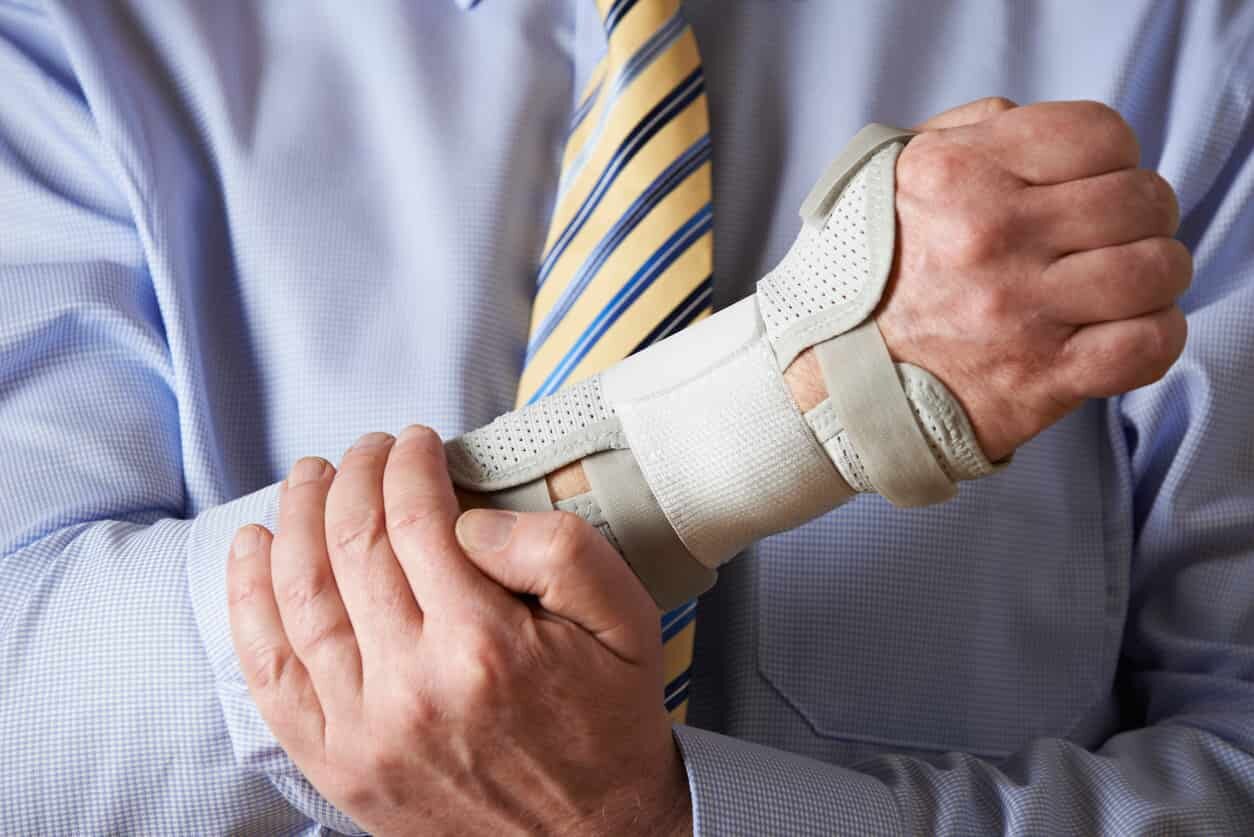Pain, weakness, numbness, tingling in the thumb, index finger, and part of the ring finger can be indicative of carpal tunnel syndrome.

Carpal tunnel affects many employees who spend long hours in front of a computer at their job. Doing repetitive typing work can lead to carpal tunnel syndrome. It can be more than mildly inconvenient, it can be extremely painful and can take months to resolve, usually requiring medical treatment, some splinting, and some physical rehabilitation, and even surgery, depending on the severity of the injury. Repetitive motion injuries should be avoided when possible and your employer should participate in taking preventative measures, like installing ergonomic office equipment.
Symptoms of Carpal Tunnel
Pain, weakness, numbness, tingling in the thumb, index finger, and part of the ring finger can be indicative of carpal tunnel syndrome. It can also lead to muscle damage in the hand and fingers. Other symptoms of carpal tunnel include:
- Numbness and/or tingling in the hand
- Pain that extends from the wrist to the elbow
- Problems with grip and fine motor movements
- Weakness is one or both hands
- Muscle deterioration
Causes: The carpal tunnel specifically refers to the area where the median nerve connects to the hand. Carpal tunnel is caused by a compression of the median nerve. Pressure on this nerve can cause a great deal of pain. The median nerve controls movement and feeling in the hand and most of the fingers.
Carpal tunnel syndrome can be more common in individuals who were born with a narrow or small carpal tunnel. Age is another contributing factor, as the incidence of carpal tunnel syndrome increases with age. The syndrome most commonly occurs in individuals between 30 and 60 years of age.
- Wrist injury or fractures
- Arthritis
- Alcohol abuse
- Obesity
- Rheumatoid arthritis
- Fluid retention during pregnancy or menopause
- Tumors or cysts in the wrist
- Infections
Many people believe that repetitive movements like using a mouse, typing, and using a computer contribute to the development of carpal tunnel, while others show that no studies actually verify this repetitive motion theory. This dispute can make a carpal tunnel workers’ compensation claim more difficult, but an experienced workers’ compensation attorney will know how to proceed.
However, if you experience a carpal tunnel injury at work, and begin noticing pain, immediately notify your employer of the injury. Any work injury should be reported right away, as there are limitations on the amount of time you can wait before reporting your injury and filing a workers’ compensation claim in Missouri. You should also seek medical treatment as soon as possible, rather than waiting. Injuries like this do not resolve without treatment.
Medical Treatment
Treatment for can includes splints, therapy, anti-inflammatory medications, and corticosteroid injections. Behavior modifications like avoiding sleeping on the wrist and using hot and cold on the injured wrist can also help to alleviate pain.
Surgery for carpal tunnel syndrome is very common and usually successful. The surgery releases the ligament that is compressing the median nerve.
Changing work conditions or duties that contribute to the pain is also usually necessary. This may mean using different equipment or modifying the way that you perform specific tasks.
St. Louis Workers Compensation Lawyer
If you wish to make a workers’ compensation claim, it may be in your best interests to contact a workers’ compensation attorney. Recovery from surgery may take months and can mean missed work days and lost wages. If your injury happened or was aggravated because of your work, you should receive compensation for medical treatment and recovery. Obtaining the compensation that you deserve can be difficult, and having a workers’ compensation attorney on your side, who understands the system, can make your case go smoothly.
Work Related Injuries
Work-Related Injuries
Work Related ACL Injury
Leg Amputation
Finger Amputation
Ankle Injury
Ankle Replacement
Arthroscopic Surgery
Work Related Arthritis
Accidental Asphyxiation
Work Related Asthma
Avulsion Injury
Back Injury at Work
Back Pain from Work
Lower Back Pain at Work
Chronic Back Pain
Head Injury Internal Bleeding
Internal Bleeding after Injury
Blood Related Illness
Broken Bones
Brain Injuries
Traumatic Brain Injury
Bursitis Work Related
Burn Injury at Work
Electric Burn
Chemical Burn
Calcaneus Fracture
Sudden Cardiac Arrest
Cardiovascular Disease
Carpal Tunnel Work Related
Cartilage Injury
Cervical Disc Replacement
Cervical Fusion
Chronic Illness
Work Related Chronic Pain
Work Related Concussion
Contagious Disease
Work Related COPD
Skin Corrosion
CRPS Disease
Crush Injuries
Cubital Tunnel Syndrome
Work Related Death
Degenerative Bone Disease
Degenerative Disc Disease Work Related
Reflex Sympathetic Dystrophy
Work Related Tennis Elbow
Elbow Injury
Epicondylitis at Work
Work Related Eye Injury
Fibromyalgia
Work Related Foot Injuries
Work Related Injuries to the Hand
Hand Arm Vibration Syndrome
Work Related Head Injury
Closed Head Injury
Open Head Injury
Work Related Hearing Loss
Heart Attack Work Related
Stroke at Work
Heat Stroke at Work
Intracerebral Hemorrhage
Hernia Work Related Injury
Work Related Herniated Disc
Hip Fracture
Hip Replacement
Hip Injuries
Intracranial Injury
Broken Jaw
Work Related Knee Injuries
Knee Fracture
Laceration
LCL Injury
Legionnaires Disease
Ligament Tear
Limb Loss
Lumbar Disc Replacement
Lumbar Fusion
Lumbar Spinal Fusion
MCL Tear
MCL Injury
Meniscus Tear
Work Related Mental Illness
Mesothelioma from Work
Work Related Muscle Problems
Work Related Neck Pain
Work Related Neck Injury
Nerve Damage from Work Related Injury
Neurological Disorders
Occupational Disease
Organ Damage
Pain and Suffering from Work Related Injury
Paralysis
Patella Fracture
Pelvic Fracture
Plantar Fascitis
Pre Existing Work Related Injury
Work Related PTSD
Radiation Sickness
Repetitive Stress Injury
Rhabdomyolysis
Rotator Cuff Tear
Rotator Cuff Surgery
Work Related Rotator Cuff Injury
Sciatica Work Related
Shift Work Disorder
Shoulder Fusion
Shoulder Impingement
Shoulder Injury
Work Related Shoulder Pain
Sick Building Syndrome
Skull Fracture
Spinal Cord Injury at Work
Spondylolysis
Sprain at Work
Work Related Repetitive Strain Injury
Work Related Stress
Stress Fracture
Subdural Hematoma
Work Related Tendonitis
Lost Tooth at Work
Trigger Finger Work Related
Vertebroplasty
Vision Impairment
Lost Vision at Work
Work Related Wrist Injuries
